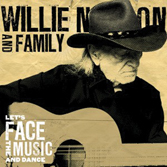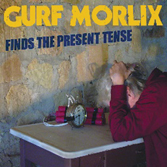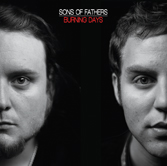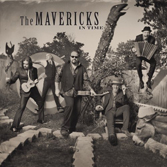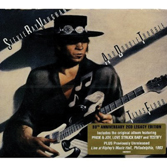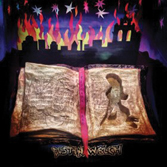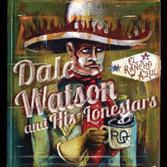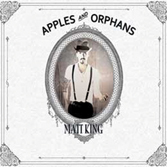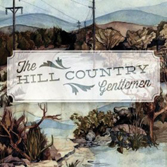 |
|---|

|
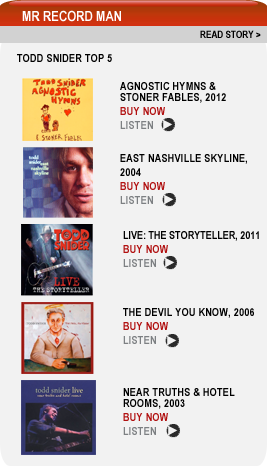
Cover Story Features |
 |
|---|
Willie Nelson tosses off perfunctory, half-baked albums with such frequency that it’s easy to forget that he’s one of the most significant country songwriters and performers of our age. And although he long ago traded the role of singer-songwriter for the mantle of iconic entertainer, he’s still capable of coming up with the occasional gem when he’s feeling inspired. Fortunately, Let’s Face the Music and Dance is one of those. More or less a pop-standards collection in the spirit of his 1978 classic, Stardust — a formula that he’s explored, with varying success, several times in the years since — the new disc emphasizes ’30s and ’40s pop standards, augmented with such outliers as the Carl Perkins rockabilly workout “Matchbox,” Spade Cooley’s Western swing chestnut “Shame On You,” the Django Reinhardt instrumental “Nuages,” and the ’80s-vintage Nelson composition “Is the Better Part Over.“
|
|
“These are my blues,” declares Gurf Morlix at his most morose near the end of Finds the Present Tense. “I’m gonna wallow in them allllll night long.” Fair enough: This is his album, dammit, and he’ll wallow if he wants to. Longtime fans of Morlix know that the guitarist/producer-turned-solo artist is actually not averse to a little levity or joke now and then; this is, after all, the guy who titled his first album Toad of Titicaca, and whose latest features a cover photo of him staring down a ticking time bomb (Present Tense, get it?). But bar a few delightfully wry exceptions (the cast-of-Bonanza recitation “Dan Blocker” from his debut springs to mind), Morlix does not dabble in the school of songwriting that Townes Van Zandt called “zippity-do-dah.” And Finds the Present Tense, his eighth album and first collection of new originals since 2009’s Last Exit to Happyland (the gap filled by his 2011 tribute album, Blaze Foley’s 113th Wet Dream), is just about his bleakest batch of zippity-free tunes yet. Opening with a prison lament is kind of par for Morlix’s course by now, but in stark contrast to “Killin’ Time in Texas” and “One More Second” (the first tracks on 2007’s Diamonds to Dust and Last Exit, respectively), “My Life’s Been Taken” doesn’t wrap its gloom around a killer hook; as Death Row dirges go, this one makes Steve Earle’s “Billy Austin” sound like a toe-tapper.
|
|
SONS OF FATHERS |
Sons of Fathers, led by David Beck and Paul Cauthen, have been widely accepted by fans of myriad genres. The reason for this can be unmistakably deciphered on their new LP, Burning Days, if it wasn’t already obvious on their 2011 self-titled debut. Like the Band of Heathens and Hayes Carll before them, Sons of Fathers successfully blend homespun folk, roadhouse rock and soulfully authentic country to create a unique document that succeeds on every level. Their songwriting on Burning Days shines, with stories in the country-noir tune “O.G.C.T.A.W” and the indie-popper “The Mansion” deftly told by taking lyrical roads less traveled. Exemplary writing is expected when it comes to quality Texas records, though; what will really set this album apart from the regional crowd in 2013 are the confidently delivered and perfectly aligned harmonies between Beck and Cauthen. In many songs, such as the title track and the acoustic stomper “Roots & Vine,” there isn’t a lead singer as much as there’s an harmonic convergence at the helm. It’s an incredible and consistently thrilling sound — reminiscent at times of indie-rock favorites the Fleet Foxes. But most of all, it’s a sound these Texas Hill Country upstarts can proudly call their own. |
THE MAVERICKS
|
No one does a love song quite like the Pavarotti of Latin-tinged roots-pop-soul, and with his old pals the Mavericks, singer Raul Malo is perfectly in his element. When they fire up those mariachi horns and squeezeboxes and integrate them with all that twang and tremolo, we’re reminded just how long we’ve waited to be romanced by this particular sonic elixir. Produced by Malo and Niko Bolas, In Time almost could be called In A Time Machine, it’s got so much vintage character. “That’s Not My Name,” with its groovy finger snaps and bent notes galore, sounds positively Everlys-like (with a nod to Roy Orbison); the boppy “As Long as There’s Loving Tonight” also has a ’60s feel. Whether it’s a majestic ballad like “In Another’s Arms,” a charm-filled, mid-tempo foot-tapper like “Born to Be Blue” or a faster frolic, like “Fall Apart,” Malo’s operatic voice and the band’s swingin’ instrumentations conjure an elegance worth reviving. If women suddenly feel an urge to buy swirly chiffon dresses and dancing heels and dudes start digging around for cool suits and suede steppers, the Mavericks have done their job. |
STEVIE RAY VAUGHAN
|
For many of this magazine’s readers, it may be hard to remember a time before Stevie Ray Vaughan. His ubiquity in the hearts, minds and ears of Texans is rivaled only by Willie Nelson, and like Willie, he also embodies Texas music to the rest of the world. However, there was a time 30 years back when SRV was known only to a select group of late-night blues aficionados across the state who had witnessed one of his jaw dropping live performances. Texas Flood changed all that. |
DUSTIN WELCH
|
The passion and intensity of a confident young artist bringing his vision to the world is an inspiring thing indeed. Dustin Welch is just that: a literate lyricist and songful shaman whose sophomore release, Tijuana Bible, finds him conjuring up a discerning collection of uniquely troubled characters, spellbinding melodies and rhythms, and fully-charged emotions. And like the protagonist of the propulsive “Jolly Johnny Junker,” a co-write with Mark Germino, Welch is “the type of man you gotta swallow by the bit.” For these are thoughtful, intricate and complex offerings that demand more than a casual consumption. And like the supposed Spanish scripture book in the title track, Welch’s songs are quite often so much more than they may initially seem to be. This is a “put-the-ear-buds-in-and-read-the-lyrics-along-with-the-song” kind of album. Welch’s expansive palette brings much spice and life to Tijuana Bible, from tangoesque to sea chanty-inspired. He goes well beyond the river and deep into those Springsteen-style Badlands on the vigorous “Across the Rubicon.” There’s a West African vibe co-mingling with Appalachian banjo on “Ash & Iron,” about a troubled soul coming to grips with his woeful life station, yet still attuned to signs of hope and relief (“I set the static dial on the radio and I hear my angels singing sweet and low.”) Drawing from a line in Hamlet, Welch paints a wistful psalm about the lonely and lost on “Sparrows.” And he brings the full power of his punkish praise band (Jeremy Nail on lead guitar, Scotty Bucklin on keys, Trisha Keefer on violin, Steve Bernal on bass, and Eldridge Goins on percussion) to bear on “Goodbye,” a gripping and robust memorial to the bonds of eternal friendship. — D.C. BLOOM |
DALE WATSON & HIS LONESTARS |
On Dale Waton’s latest album, the pompadoured honky-tonker wastes little time in displaying the honesty that’s earned him the nickname “The Real Deal.” In the album’s opening line, he sings, “I lie when I drink, and I drink a lot.” As usual, Watson proudly plays the time-tested sounds of what many would consider retro country. But keen, humorous songwriting and an increasingly lively delivery keep this collection from being anything but freshly brewed and free of old sawdust. In fact, this is Watson’s quickest-stepping record in a while. The song titles, at least to a point, let one know what’s in store before even pushing “play.” “I Hate to Drink Alone,” “I Drink to Remember,” and “Drink Drink Drink” each line-up the musical shots of Mezcal to grin-rendering effect. Meanwhile, “We’re Going to Get Married,” the tear-inducing “Daughter’s Wedding Song,” and “Give Me More Kisses” show a little tenderness, and the ultra-catchy “Quick Quick Slow Slow,” “Slow Quick Quick,” and “Cowboy Boots” all find Watson on sure footing as an authoritative, tattooed dance instructor. When it comes to country music tailor made for lovin, dancin’, and a hell of a lot of boozin’, Watson’s your man — and El Rancho Azul is the man at his best. — KELLY DEARMORE |
MATT KING
|
For some time now, Matt King has been pegged as an artist with a must-see live show — an endorsement that tends to overshadow his albums. But those albums are very much indispensible companion pieces, and his latest is no exception. Apples and Orphans revisits King as the Boardwalk Empire meets O Brother, Where Art Thou character too sly to be a barker and too bold to go unnoticed. His vaudevillian steam-punk style is like no one else in “Texas country,” the generic lump term people may erroneously file this album under. There’s just too much going on here. It’s a listening experience where something new arises in each play. Perhaps it’s too busy for some, or maybe even too dark, with songs like “Shotgun” where King announces, “I got a shotgun and I’m no good/A mind is a dangerous neighborhood.” So for anyone averse to music that breaks convention, steer clear. But for more open-minded lovers of music and songwriting as an art form, this is an exciting album to play repeatedly. King’s fans accustomed to his singular sound from his previous albums and live shows will be pleasantly greeted by their favorite sideshow performer. — CODY OXLEY
|
ASHLEY MONROE
|
Ashley Monroe is an old soul wise beyond her years. Clear evidence: The Nashville resident’s Like a Rose. Monroe’s buoyant sophomore full-length album — and first release since her time in the Miranda Lambert-focused mainstream spotlight as one of the Pistol Annies — backs equal measures edge (“Weed Instead of Roses”) and energy (“Monroe Suede”) with a seasoned songwriter’s lyrical elegance (“Used”). “I was only 13 when daddy died and momma started drinking and my brother just quit trying,” the 26-year-old sings on the opening title track. “I’m still bouncing back, heaven only knows how I came out like a rose.” The new collection seamlessly swaps earthy (“Two Weeks Late”) and engaging narratives (“She’s Driving Me Out of Your Mind”) throughout, and the sharp storytelling only briefly wanes (the relatively faceless “You Got Me”). The album’s closer alone suggests that Monroe could be the Pistol Annie to keep an eye on from this point forward. “Well, I noticed you right off the bat in those cowboy boots/Who couldn’t help but see you in that rhinestone suit?” goes the back-and-forth on the cheeky Blake Shelton duet “You Ain’t Dolly (And You Ain’t Porter),” a kindred spirit to Hayes Carll’s “Another Like You.” “That’s ’cause I’m the reigning queen of karaoke night/Well, if I get drunk enough to sing, hell, I just might.” Their push and pull delivers traditional country music at its best. — BRIAN T. ATKINSON |
RICH O’TOOLE
|
Rich O’Toole likes girls. Summertime girls, Texas girls, California girls, Chicago girls, and especially unforgettable drunk girls whose names he may or may not quite catch. Girls wearing bikinis and pearls (?) with “sweet tan lines and legs that don’t stop,” cranking “Josh Abbott on the radio” while knocking back jello shots and waiting for a whirl behind a ski boat. In other words, the kind of fun-loving girls who might dig Rich O’Toole’s music, buy his albums and drag their boyfriends (or better yet, their girlfriends) out to his shows. That’s the target audience he’s clearly aiming for with all 10 tracks on his latest, the humbly titled Brightwork: A Manifesto by Rich O’Toole, and assessed with that purpose in mind, the album hits its mark. O’Toole’s voice may not be particularly distinctive, but it’s strong and self-assured enough to sell both hooky anthems like “Miss Wherever You Are” and earnest, heart-on-sleeve melodic ballads like “January 21st” without breaking a sweat. O’Toole went with “Drunk Girl” (which he didn’t write, but might as well have) as the album’s first single, but it’s really not hard to imagine any one of these songs sitting comfortably on the radio next to any song by his name-checked buddy Abbott. In fact, for all the fuss he made on Twitter recently about wanting to disassociate himself from the Texas country clique and rebrand his music “indy” (sic) country, O’Toole’s sensibilities are mainstream to the core, right down to the Bruce Springsteen (who saved his soul, he notes at one point) tune he picked to cover: “Dancing in the Dark.” O’Toole’s version sticks so close to the Born in the U.S.A. original, he might as well try to lure Courtney Cox away from Cougar Town long enough to shoot a video. But it’s actually Brightwork’s least overtly polished song, the closing “I Love You,” that leaves the most-lasting impression. The laid-back but playful track finds O’Toole at his most down-to-earth and unassuming, running down a list of his favorite things (from the Beatles and the Boss to Whataburger and Waffle House) before admitting that “the one thing about me that rings so true/I like all of that but baby, I love you.”) Corny, yes, but genuinely charming, too. A little more of that in his next “manifesto” just might go a long way towards endearing O’Toole to an audience willing to give him a listen without the requisite round of jello shots. — RICHARD SKANSE |
CHRIS KING
|
Chris King may not be a household name yet, but he’s hardly a stranger to those-in-the-know on the Texas music scene. For some time now, the Trishas’ merch designer extraordinaire has been the man that bands call to the stage to sit in with them or that other songwriters advise you to listen to. And as his winning full-length debut, 1983, makes clear, he’s got the goods to back up the buzz. On the surface, 1983 offers Texas music fans easily identifiable traces of lots of other acts they probably already love, from the peppy harmonies of Midnight River Choir (“Still Haven’t Said” and “Antler Inn Ballroom”) to the twangy throwback of Jason Eady (“You Leave Behind”). The opening track feels strongly reminiscent of vintage Jason Isbell, and Kelley Mickwee and Jamie Wilson of the aforementioned Trishas drop in on the album to co-write (Mickwee on “I’ve Been Dying”) and offer harmonies. But as apparent as all of King’s influeces seem to be here, the thing that makes 1983 special is the way he blends them all together and comes away with something new. Standouts include “Homeland,” the album’s most radio-friendly tune, and the closing “Something Less Formal,” but there’s really no discernable filler. On the whole, 1983 is an entirely fun album to listen to — the kind that you’ll be playing halfway through for the second time in a row before you realize it.
— CODY OXLEY |
THE HILL COUNTRY GENTLEMEN
|
The Hill Country Gentlemen have been knocking around the San Marcos scene for going on two years now, and their self-titled debut came out last summer, so … my bad for not catching up to them until now. Sometimes the best discoveries in a crowded music scene are the ones hiding in plain sight. I saw the Gents live before I heard the record, not knowing any of the songs apart from a couple of shockingly well-executed covers (most notably a transcendent “The Weight” which could have been the highlight of any overstuffed all-star tribute to Levon Helm), and what struck me most was how great they sounded, exuding a confidence, chemistry and overall sense of got-their-shit-togetherness more suggestive of crack Nashville or Memphis session pros than a band of five young college-town hippie slackers. And they sound every bit as strong on their album, which founding members Troy Stone (lead vocals, acoustic guitar, harmonica), Kevin D. Humphrey (lead guitars, steel, organ, Resonator), Jeremiah Sawyer (bass), and Peter Lyman (drums) recorded at the Cheatham Street Woodshed before pianist Dan Holmes joined the band. Admittedly, there’s nothing explicitly “new” about their hybrid of Flying Burrito Brothers-style cosmic country — this road has been travelled many times since the No Depression-documented alt-country resurgence of the mid-90s. And yet, there’s just a hard-to-peg but palpable something about the way they pull it off that recalls the immediacy and freshness of genre touchstones like Son Volt’s Trace and Whiskeytown’s Stranger’s Almanac. The rhythm section and gifted multi-instrumentalist Humphrey shine throughout, and frontman Stone is a strong songwriter and singer, as convincing embodying the psyche of a famous bank robber in the opening “Floyd” as he is that of, well, a young college-town hippie slacker in the disarmingly rousing San Marcos anthem that closes the set, “Heaven in the Hill Country.” Really, the only knock against this debut is that it’s a tad over-long; none of the 12 songs necessarily stands out as filler, but the 53-minute total playing time kind of kills the desire to play the album again and again and really let it sink in. But as first impressions go, the Hill Country Gentlemen will knock you out. — RICHARD SKANSE |
|
|
